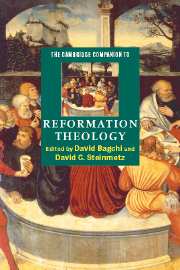Book contents
- Frontmatter
- Introduction
- 1 Late medieval theology
- 2 Lollardy
- 3 Hussite theology and the law of God
- 4 The theology of Erasmus
- 5 Luther
- 6 Melanchthon
- 7 Confessional Lutheran theology
- 8 The theology of Zwingli
- 9 Bucer
- 10 The theology of John Calvin
- 11 John Calvin and later Calvinism
- 12 The theology of Thomas Cranmer
- 13 The theology of the English reformers
- 14 The Scottish Reformation
- 15 An introduction to Anabaptist theology
- 16 Catholic theologians of the Reformation period before Trent
- 17 The Council of Trent
- Conclusion
- Select bibliography
- Index
- Series list
3 - Hussite theology and the law of God
Published online by Cambridge University Press: 28 May 2006
- Frontmatter
- Introduction
- 1 Late medieval theology
- 2 Lollardy
- 3 Hussite theology and the law of God
- 4 The theology of Erasmus
- 5 Luther
- 6 Melanchthon
- 7 Confessional Lutheran theology
- 8 The theology of Zwingli
- 9 Bucer
- 10 The theology of John Calvin
- 11 John Calvin and later Calvinism
- 12 The theology of Thomas Cranmer
- 13 The theology of the English reformers
- 14 The Scottish Reformation
- 15 An introduction to Anabaptist theology
- 16 Catholic theologians of the Reformation period before Trent
- 17 The Council of Trent
- Conclusion
- Select bibliography
- Index
- Series list
Summary
Fifteenth-century Europe viewed Jan Huss and the Hussites as heretics, while the latter perceived themselves as reformers. Conflict was inevitable. Huss was burned at the stake in 1415 and crusades were dispatched to suppress his recalcitrant followers. Despite these adversities, Hussitism aimed at reforming church and society. This reform programme codified its goals in the 'Four Articles of Prague', promulgated in 1420: free preaching of the Word of God, communion in both kinds for all believers, elimination of ecclesiastical secular power, and the punishment of serious sins. Free preaching existed virtually everywhere in Hussite Bohemia and utraquism - both bread and wine for all believers - began in 1414. Divesting ecclesiastical wealth became a consequence of the Hussite wars, and by the 1420s an office was established to deal with punishing sin. Across the broad expanse of Hussite theology, these 'Four Articles' functioned as a reform focus. Hussite reform can be fully understood only within an eschatological consciousness. This awareness can be detected principally within the radical dimensions of the Hussite movement.
In its earliest stages, the fifteenth-century reformation in Bohemia was neither doctrinal nor theological, but moral. This can be traced to a reforming tendency in the fourteenth century associated with Jan Milíč of Kromĕříž, Matĕj of Janov, and others. Huss stood in that tradition. Eventually, doctrinal reform and theology merged with moral renewal in an effort to reform the church ‘in head and in members’. Reform advanced along several theological fronts, but three are especially important: sacraments, scripture, and soteriology. Before turning to these issues, it is important to note that the guiding principle for Hussite theology and reform lay in an idea called ‘the law of God.’
- Type
- Chapter
- Information
- The Cambridge Companion to Reformation Theology , pp. 22 - 27Publisher: Cambridge University PressPrint publication year: 2004



